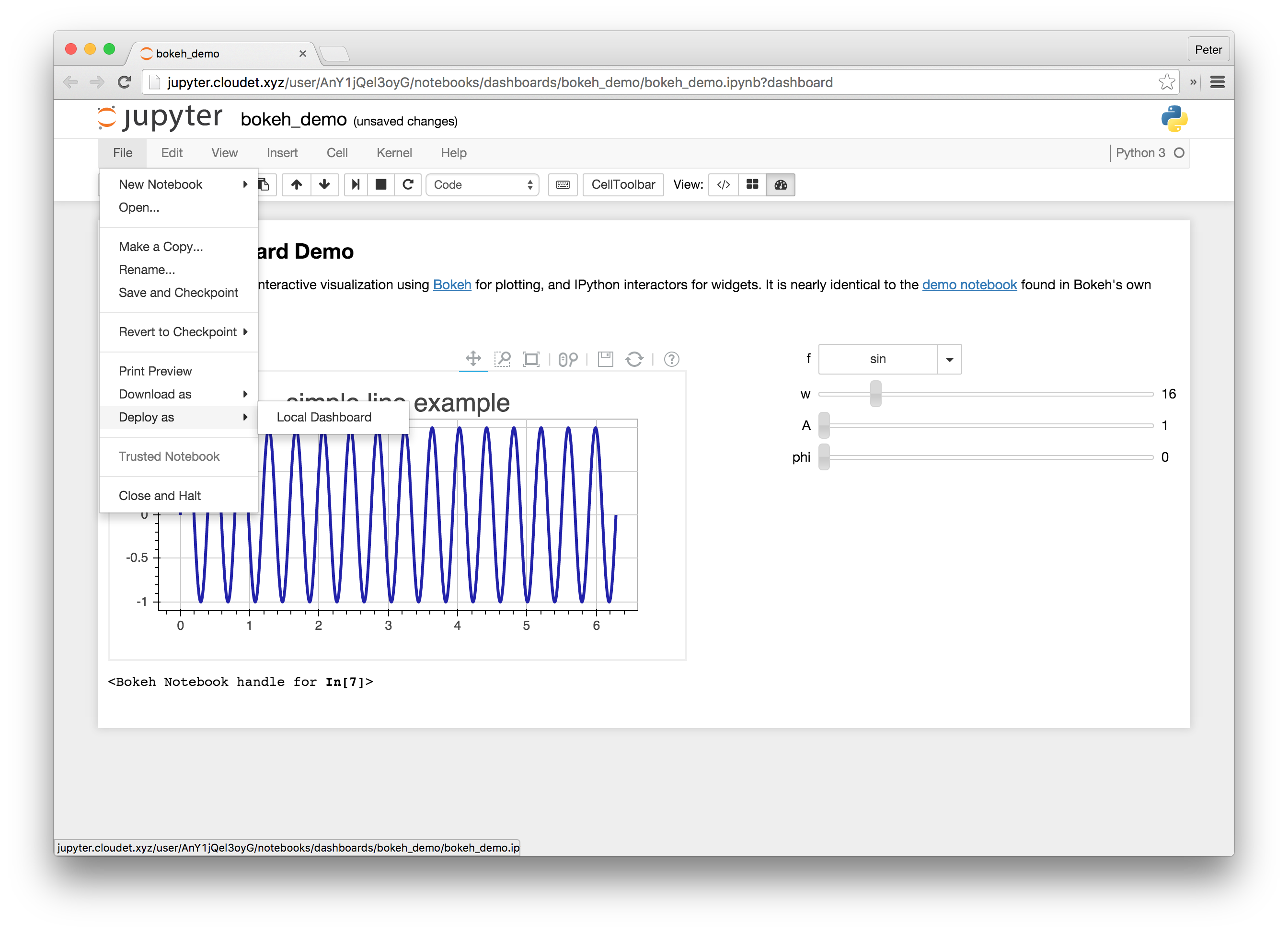jupyter-attic / Dashboards_bundlers
Programming Languages
Labels
Projects that are alternatives of or similar to Dashboards bundlers
[RETIRED] Jupyter Dashboards Bundlers
This project has been retired. See the proposal to move the project to jupyter-attic, announcement of the proposal on the mailing list, and Steering Council vote on the proposal PR for more information.
The dashbaords bundler extension is an add-on for Jupyter Notebook. It takes a notebook with layout information from the dashboard layout extention and lets you download it or directly publish it to the experimental dashboard server.
What It Gives You
- File → Download as → Jupyter Dashboards Server bundle (.zip) - menu item to download the current notebook and its associated assets for manual deployment on a Jupyter Dashboards server.
- File → Deploy as → Dashboard on Jupyter Dashboards Server - menu item to deploy the current notebook and its associated assets as a dashboard on a target Jupyter Dashboards server.
Prerequisites
- Jupyter Notebook >=5.0 running on Python 3.x or Python 2.7.x
- Edge, Chrome, Firefox, or Safari
If you are running an older version of the notebook server, you should use a version of this package prior to the 0.9 release.
Installing and Enabling
The following steps install the extension package using pip and enable the
extension in the active Python environment.
pip install jupyter_dashboards_bundlers
jupyter bundlerextension enable --sys-prefix --py dashboards_bundlers
Disabling and Uninstalling
The following steps deactivate the extension in the active Python environment
and uninstall the package using pip.
jupyter bundlerextension disable --sys-prefix --py dashboards_bundlers
pip uninstall jupyter_dashboards_bundlers
Use It
Currently, there are two bundlers available in this package.
Download as → Jupyter Dashboards Server bundle (.zip)
The first option bundles your notebook and any associated frontend assets into a zip file which you can manually deploy on a Jupyter Dashboards Server. To use it:
- Write a notebook.
- Define a dashboard layout using the
jupyter_dashboardsextension. - If the notebook requires any frontend assets (e.g., CSS files), associate them with the notebook.
- Click File → Download as → Jupyter Dashboards Server bundle (.zip).
- Install jupyter-incubator/dashboards_server by following the project README.
- Unzip the bundle in the
data/directory of the Jupyter Dashboard Server and run it.
This bundler is compatible with:
-
jupyter_declarativewidgets>=0.5.0when deploying dashboards with declarative widgets -
ipywidgets>=5.0.0,<6.0.0when deploying dashboards with ipywidgets
Deploy as → Dashboard on Jupyter Dashboards Server
The second option directly sends your notebook and any associated frontend assets to a Jupyter Dashboards Server. To use it:
- Run an instance of the Jupyter Dashboards Server by following the instructions in the jupyter-incubator/dashboards_server project README.
- Set the following environment variables before launching your Jupyter
Notebook server with the bundler extensions installed.
-
DASHBOARD_SERVER_URL- protocol, hostname, and port of the dashboard server to which to send dashboard notebooks -
DASHBOARD_REDIRECT_URL(optional) - protocol, hostname, and port to use when redirecting the user's browser after upload if different fromDASHBOARD_SERVER_URLand if upload response has no link property from the dashboard server (v0.6.0+) -
DASHBOARD_SERVER_AUTH_TOKEN(optional) - upload token required by the dashboard server -
DASHBOARD_SERVER_NO_SSL_VERIFY(optional) - skip verification of the dashboard server SSL certificate (for use in dev / trusted environments only!)
-
- Write a notebook.
- Define a dashboard layout using the
jupyter_dashboardsextension. - If the notebook requires any frontend assets (e.g., CSS files), associate them with the notebook.
- Click File → Deploy as → Dashboard on Jupyter Dashboard Server.
- Enjoy your dashboard after the redirect.
This bundler is compatible with:
-
jupyter_declarativewidgets>=0.5.0when deploying dashboards with declarative widgets -
ipywidgets>=5.0.0,<6.0.0when deploying dashboards with ipywidgets
Caveats
It is important to realize that kernels launched by your deployed dashboard will not being running in the same directory or possibly even the same environment as your original notebook. You must refer to external, kernel-side resources in a portable manner (e.g., put it in an external data store). You must also ensure your kernel environment has all the same libraries installed as your notebook authoring environment.
It is also your responsibility to associate any frontend, dashboard-side assets with your notebook before packaging it for deployment. To aid in this task, the two bundlers here take advantage of the notebook association feature supported by the notebook bundler API. See the associations demo for the markup you can use to refer to external files that should be included in your dashboard deployment.
If you are using declarative widgets in your dashboard, you should be mindful of the following when you deploy your dashboard:
- You must run the entire notebook successfully before deploying. This action ensures all external Polymer components are properly installed on the notebook server and can be bundled with your converted notebook.


